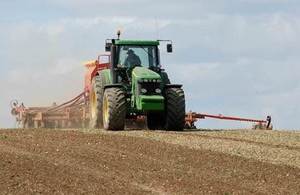Environment Secretary Michael Gove has today committed to conserve and enhance England’s most cherished landscapes as a new review launches into the nation’s National Parks and Areas of Outstanding Natural Beauty (AONBs).
Nearly 70 years after the country’s National Parks were first established, opening up the countryside and allowing more people to connect with nature, an independent panel will look at how these iconic landscapes meet our needs in the 21st century – including whether there is scope for the current network of 34 AONBs and 10 National Parks to expand.
The review, led by writer Julian Glover, will also explore how access to these beloved landscapes can be improved, how those who live and work in them can be better supported, and their role in growing the rural economy.
Weakening or undermining their existing protections or geographic scope will not be part of the review, which will instead focus on how designated areas can boost wildlife, support the recovery of natural habitats and connect more people with nature.
Undertaking a review is one of the key commitments of the government’s 25 Year Environment Plan, which outlines our vision for improving the environment over a generation by connecting people with nature and helping wildlife to thrive.
Environment Secretary Michael Gove said:
The creation of National Parks almost 70 years ago changed the way we view our precious landscapes – helping us all access and enjoy our natural world.
Amid a growing population, changes in technology, and a decline in certain habitats, the time is right for us to look afresh at these landscapes. We want to make sure they are not only conserved, but enhanced for the next generation.
Sir Arthur Hobhouse’s landmark report in 1947 paved the way for the creation of England’s network of designated landscapes, with the National Parks and Access to the Countryside Act passed in 1949.
The Act, described at the time as a “recreational gift to Britain’s returning Second World War service men and women”, set out to recognise, conserve and enhance access to landscapes deemed to be “of national importance and quality”.
These days the rugged mountains, unspoilt coastlines and vast moorlands of the nation’s 34 AONBs and 10 National Parks attract more than 260 million visitors a year from at home and abroad.
Julian Glover, who will lead the review, said:
Our protected landscapes are England’s finest gems and we owe a huge debt to past generations who had the wisdom to preserve them.
The system they created has been a strength, but it faces challenges too. It is an honour to be asked to find ways to secure them for the future. I can’t wait to get started and learn from everyone who shares an interest in making England’s landscapes beautiful, diverse and successful.
Chair of National Parks England, Margaret Paren, said:
National Parks are iconic and inspirational cultural landscapes. The Government’s 25 Year Environment Plan refers to their establishment as among the outstanding environmental achievements of the past 100 years. We very much welcome the announcement of the review and intend to play a full part.
Our National Parks offer so much to the country. And as we approach the 70th anniversary of the founding legislation we look forward to a future where their beauty is enhanced; they are loved and accessible for everyone; and they continue to support thriving communities in these working landscapes.
Chair of the National Association of AONBs, Philip Hygate, said:
The world has changed significantly since the designation of Gower, the first Area of Outstanding Natural Beauty, but our fundamental requirement for beautiful, inspiring places in which to live, work, and relax is probably greater now than ever before.
The National Association for AONBs is delighted to support this exciting review and will work closely with Julian Glover and the review panel to help ensure that all of England’s special landscapes are equally recognised for the value they provide to the nation, and their fundamental importance to future generations.
AONBs and National Parks are some of our most cherished sites, spanning from the Lake District, which was recently announced as a UNESCO World Heritage site, to the picturesque Cornwall AONB.
They cover a quarter of England’s land and are home to over 2.3 million people – with more than 66 per cent of us living within half an hour of a National Park or AONB. They also generate over £20 billion for the rural economy, and support 75,000 jobs.
Julian Glover
Associate editor at the London Evening Standard and author of the biography Man of Iron: Thomas Telford and the Building of Britain. He has worked as leader writer and columnist at the Guardian and as a Special Adviser in Number 10 and the Department for Transport.
He will be supported by an advisory panel bringing a vast breadth of experience in landscape, biodiversity, heritage, farming and rural issues.
The panel will be comprised of:
Lord Cameron of Dillington
Cross-bench peer, farmer and landowner. As the former Chair of the Countryside Agency, he is a strong advocate for rural affairs. He is currently the chair of the Natural Environment and Rural Communities Act 2006 Committee and the Advisory Council for the Centre for Ecology and Hydrology. He is also on the Steering Board of the Government’s Global Food Security Programme.
Jim Dixon
Chief Executive of the Peak District National Park Authority for 12 years, before stepping down in 2014. He is currently a writer on countryside issues, including for the Times, and a trustee of the Heritage Lottery Fund.
Sarah Mukherjee
Former BBC environment and rural affairs correspondent and previous Director of Environment at Water UK. She is currently Chief Executive of the Crop Protection Association. She is a trustee and advisory group member for several charities, supporting both environmental stewardship and education in farming.
Dame Fiona Reynolds
Formerly the Director-General of the National Trust and current Master of Emmanuel College, Cambridge and Chair of the Green Alliance. She is the author of The Fight for Beauty (2016), a history of thought and public policy on landscapes and environment in Britain.
Jake Fiennes
Estate Manager of the Raveningham Estate for the last 24 years, promoting nature conservation alongside arable farming. He will be joining the 25,000 acre Holkham Estate in autumn 2018 as their General Manager for Conservation. He is also a trustee and advisory group member of several organisations including the National Farmers’ Union’s Environmental Forum and the Norfolk Farming and Wildlife Advisory Group.
Read the full terms of reference.

